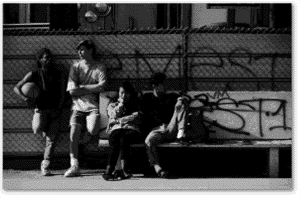|
Innovative Approaches to Juvenile Indigent Defense
Patricia Puritz and Wendy Wan Long Shang
 More than 30 years have passed since In re Gault, 387 U.S. 1 (1967) established the constitutional right of children to appointed counsel in juvenile delinquency proceedings. In this landmark opinion, which remains the standard for children's due process rights, Supreme Court Justice Abe Fortas announced that "[u]nder our Constitution, the condition of being a boy does not justify a kangaroo court" (387 U.S. at 28).
More than 30 years have passed since In re Gault, 387 U.S. 1 (1967) established the constitutional right of children to appointed counsel in juvenile delinquency proceedings. In this landmark opinion, which remains the standard for children's due process rights, Supreme Court Justice Abe Fortas announced that "[u]nder our Constitution, the condition of being a boy does not justify a kangaroo court" (387 U.S. at 28).
Congress expressed similar concern regarding the need to safeguard children's rights when it enacted the Juvenile Justice and Delinquency Prevention (JJDP) Act in 1974 (42 U.S.C. § 5601 et seq., P.L. 93-415). When Congress reauthorized the JJDP Act in 1992 (P.L. 102-586), it reemphasized the importance of lawyers in juvenile delinquency proceedings. Congress charged the Office of Juvenile Justice and Delinquency Prevention (OJJDP) with developing a program to enhance the quality of due process available to children in juvenile court by improving the level of legal representation in delinquency proceedings.
In 1993, OJJDP awarded a competitive grant to the American Bar Association's (ABA's) Juvenile Justice Center to determine ways to build the capacity of the juvenile defense bar and improve the quality of legal representation available to children in trouble. The ABA and its partners, the Youth Law Center and Juvenile Law Center, embarked upon a study to determine the issues and obstacles impeding the legal representation of delinquents. Project staff also began to develop strategies to build the capacity of the juvenile defense bar through training, technical assistance, and other supportive services. The findings of this study were released in 1996 in a report entitled A Call for Justice: An Assessment of Access to Counsel and Quality of Representation in Delinquency Proceedings (Puritz et al., 1995).
The report focused on serious concerns that the interests of many young people in juvenile court are significantly compromised, leaving many juvenile defendants literally defenseless. Such concerns are especially critical at a time characterized by unprecedented scrutiny, criticism, and transformation of the Nation's juvenile justice system and a trend toward increased reliance on the incarceration of children as an answer to juvenile crime. The stakes for children are much higher than in the past: Many States have changed the purpose clause of their juvenile codes to emphasize punishment and public safety considerations rather than treatment; sanctions have become more punitive and longer in duration; and more juveniles are locked up in secure detention centers, training schools, jails, and prisons than ever before (Puritz et al., 1995). Mail surveys, telephone interviews, and indepth site visits with juvenile defenders revealed that heavy caseloads were the most significant barrier to effective legal representation. With crushing caseloads, often in excess of 500 cases, even the most conscientious juvenile defenders struggle just to keep their heads above water. Often, defenders have no time to meet with clients prior to the detention hearing. Resources are often inadequate to investigate the charges or gather critical information from families, schools, or social service agencies. Despite defenders' best intentions, they often find it impossible to present their clients in the best possible light. The results are likely to be secure detention of youth who pose no significant danger to themselves or others, reduction in the accuracy of judicial decisionmaking, unnecessary transfers of juveniles to the adult criminal justice system, dispositions that have little connection to public safety or children's needs, and a denial of fundamental fairness.
The role of counsel is central to these issues. Young people need, and are entitled to, effective representation. Youth require the active assistance of trained counsel to challenge prosecution evidence and to present evidence on their behalf. If the charges against them are sustained, juveniles need representation to ensure that the dispositional order is fair and appropriate. If incarcerated, youth need access to attorneys to help them respond to myriad postdispositional legal issues. If tried as if they were adults, juveniles need defenders who have developed special expertise in working with the unique problems criminal adolescent defendants present.
The impact of inadequate representation on youth -- and their lawyers -- is devastating. Children represented by overworked attorneys frequently do not understand what is happening in court and come away with the impression that their attorneys do not care about them. Similarly, burnout, job dissatisfaction, and anxiety over never having enough time to do a complete job are serious problems for many caring juvenile defense attorneys.
 |
| Innovative Approaches to Juvenile Indigent Defense |
Juvenile Justice Bulletin
· December 1998 |
|